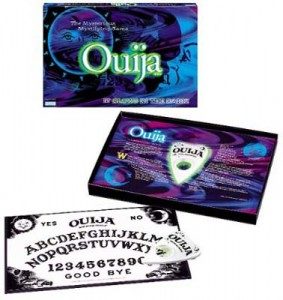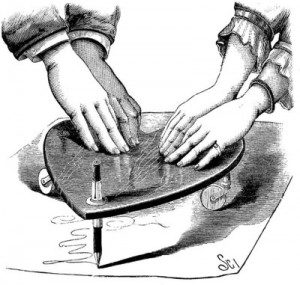 In the oft-misunderstood spirit of Halloween, as the days grow shorter and the nights grow darker, the cool winds of autumn pull at our coat tails and coloured leaves litter the streets. We revel in the excitement of our children, as visions of ghouls and ghosts become mixed with sugary notions of fun and costumed trickery.
In the oft-misunderstood spirit of Halloween, as the days grow shorter and the nights grow darker, the cool winds of autumn pull at our coat tails and coloured leaves litter the streets. We revel in the excitement of our children, as visions of ghouls and ghosts become mixed with sugary notions of fun and costumed trickery.
October is the month of dying seasons, when our thoughts often turn to those people that have passed before us. In contrast to the historical idea of Samhain (commonly referred to in Wiccan circles as All Hallows Eve) and also known in Catholic traditions as All souls Day, most people these days take pains to celebrate this typically convoluted and commercialised holiday at the end of October, the vast majority having little idea of the real sentiment behind the celebration at all.
Mixed in with these month long advertising frenzies for plastic costumes, candy and a general condoning of impious attitudes toward the dead, is a yearly flood of interest in what may be the most misconstrued item of occult renown the world has ever known; the Ouija Board.
If you were to step out your door and ask any number of people you may run into on the street, what a Ouija Board is, there will be no mistaking the widespread familiarity people have with this lettered board and harmless planchette; people will expound on the creepy powers of Ouija, they will warn of the dangers and extol memories of past transgressions, usually at the mercy of some terrifying encounter with demonic influence, and most will relay the idea that the Ouija Board is an ancient practise of magical commune with the dead. Most would do this, though most would be completely wrong.
The Spirit Board, as the Ouija is generically referred, is by all accounts a very recent invention. In fact Ouija, a word whose etymology is entirely unknown and is widely believed to be completely made up, is a trademarked product name, owned by Hasbro. Yes, the toy company.
The Spirit board and each of its hundreds of various incarnations is, in all seriousness, a toy; though it didn’t necessarily start out that way. A man by the name of Charles Kennard, along with his attorney and associate Elijah Bond, made application to the US Patent office for a planchette and lettered board on May 28, 1890, and subsequently received US Patent #446,054 for what they termed ‘Psychographs, with sound producing numbers’. In the patent document, at the very top, the classification for the product is specified as “Toy or Game”.[1]
In 1901, Kennard, through the ‘The Kennard Novelty Company’, handed production of the Spirit Board over to his employee William Fuld, who coined the term Ouija (most believe he fabricated the word from the French “oui” , meaning ‘yes’ and the German ‘ja’, also meaning ‘yes’). It was Fuld’s ingenious marketing of the product, hence forth known as the Ouija Board, that skyrocketed it’s popularity among both competitors in the Toy and Game making industry of the turn of the century, but also among the wildly growing Spiritualist movement of the same time.
During his reign as the worlds only Ouija manufacturer, Fuld was the complainant in many trademark and patent infringement lawsuits, against others who saw a financial opportunity in selling what may be the highest profiting entertainment device conceived of prior to modern electronics.
 At the conclusion of Fuld’s life in 1927, he held exclusive rights to the use and manufacture of the game, though his estate brokered a deal with the budding toy manufacturer Hasbro in 1966, to have them purchase the rights to the Ouija franchise, and since that point, the Ouija Board has been manufactured and distributed by the Hasbro Toy Company exclusively.[2]
At the conclusion of Fuld’s life in 1927, he held exclusive rights to the use and manufacture of the game, though his estate brokered a deal with the budding toy manufacturer Hasbro in 1966, to have them purchase the rights to the Ouija franchise, and since that point, the Ouija Board has been manufactured and distributed by the Hasbro Toy Company exclusively.[2]
This somewhat bland history of the Ouija Board -now also known by many other names, such as The Angel Board, The Spirit Communication Board, Planchette Ghost Board, Ghost Board, and a host of other such terms- says nothing about the game’s ability to either communicate with the dead, or to open gateways of spiritual commune, or to scare the bejesus out of kids and adults alike. It says nothing about the efficacy of the concept of Spirit Board communication as a tool for Ghost Hunting or spiritual research, and it says nothing about the legitimacy of the concept as anything more than a novelty.
The legendary ability of Ouija Boards to facilitate question and answer periods between educated paranormal investigators, or ignorant teenagers or even robe wearing psychic charlatans, and the dearly departed, is founded on nothing more than the glorified marketing of Mr. William Fuld at the height of western society’s most gullible period of development. This was a time when flimflam was a respectable profession among salesmen, when snake oil and mechanically aided séance were rampantly offered to anyone with the means to afford the scam. (Though one wonders how far we’ve really come)
In your impromptu street survey (as suggested earlier), you would certainly have encountered a preponderance of expert advice for how to deal with the Ouija Board, and likely at least a few warnings to avoid the use of this toy, for fear of inviting such forces as demons, inter-dimensional creatures, evil spirits and even the devil himself, right into your home, or even your own soul (depending on the theistic beliefs of the advisor in question). Popular culture has simultaneously vilified and mystified the reputation of the Ouija Board; there is a general consensus that mistreating or disrespecting the so-called power of the Ouija Board is akin to taunting a violent bully when there’s no way to escape his inevitable wrath.
In fact, the government of Great Britain has banned the sale of Ouija board and the like since the 1970’s, though this legality is based more on the idiotic behaviour which people will partake in on their own accord, rather than any demonic or otherwise influence exerted by the board.
 In reality, the Ouija Board, by that name or by any other, is a simple collection of cardboard, or wood, and plastic. There is no ritualistic practise in its manufacture or sale, there is nothing special about any part of it, except…the person who intends to use it.
In reality, the Ouija Board, by that name or by any other, is a simple collection of cardboard, or wood, and plastic. There is no ritualistic practise in its manufacture or sale, there is nothing special about any part of it, except…the person who intends to use it.
And a great many people have criticised the intention of the people who would find themselves using such a toy for anything other than party tricks.
Dr. Jimmy Lowry has been outspoken about the fallacy of Ouija Boards, and of the mindset that fools regular people into believing that the simple act of placing your hands on a plastic planchette will somehow open a doorway to another realm. His theistic damnation of the toy does seem to be a bit much, but his point remains as poignant to the agnostic as to the devout parishioner.[3]
So what is happening when a pair of would-be mediums tempts the spirits with the use of a Spirit Board?
The most popular theory, the Ideomotor effect or automatism -essentially this is the psychological process by which an idea or suggestion creates a subconscious action intended to complete the idea- is a fancy way of saying that the results achieved by users of Ouija Boards is entirely self-inflicted.[4] Others suggest that there is an element of telekinesis involved, which might explain the vastly divergent results experienced by so many people; some experience immediate and dramatic response from the board (or from their own psyche, depending on which explanation you subscribe to), while others experience little to no response at all.
But throughout all of this we are faced with a truth, a truth that is ignored by so many people, in so many various positions and endeavours on spiritual fronts. In our world, our reality, which includes some of the strangest natural phenomena, some of the weirdest science and the oddest environmental influences conceivable by man, why do we jump to the conclusion that the effects shown to us (or by us) through the Ouija Board are the will of ghosts or demons? Is our obsession with death and the hereafter so compelling that we actively seek out ways to express our own hopes and fears in that regard through toys?
The answer to that last question is most definitely ‘yes’, though the first question is a little harder to satisfy. Of the possibilities, most significantly including the untapped powers of the human brain, we give credit for the awesome potential of mankind to the mysteriously safe entities of fantasy and dream. It’s a cop out…it’s an excuse and a way to avoid the ultimate culpability, to avoid the admission that we are all, ultimately accountable for our actions, our words and our thoughts. If we buy into the marketing of Fuld or his predecessor Kennard, and we accept that it is the influence of the hereafter that affects our fates, then we are no longer responsible for where that influence takes us.
In the end of it all there is no reason to fear the Ouija; it is not a demonic doorway, nor is it a tool for communicating with the dead…it remains a toy, and a fun house mirror of our own fears and fantasies. Though, in so much as there is no factual reason to avoid the game of fortune telling with a Spirit Board, there is also no reason to connect it to what should be a hallowed celebration of those people who have passed on before us.
[1] See (via Google Patents) US Patent #446,054: http://www.google.com/patents?id=0aU_AAAAEBAJ&printsec=abstract&zoom=4&source=gbs_overview_r&cad=0#v=onepage&q=&f=false
[2] See the Wikipedia entry for Oujia Board: http://en.wikipedia.org/wiki/Ouija
[3] For more information on Dr. Lowry, see: http://www.paranormality.com/ouija_board.shtml
[4] See the Wikipedia entry for Ideomotor Effect: http://en.wikipedia.org/wiki/Ideomotor_effect
